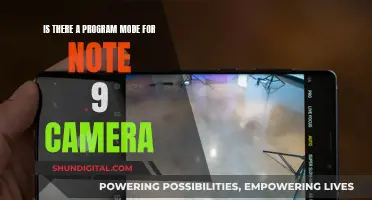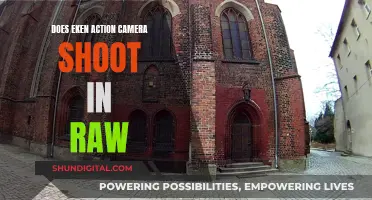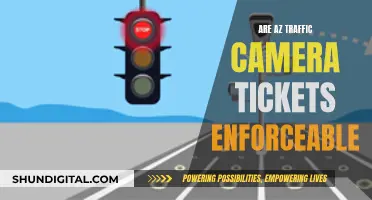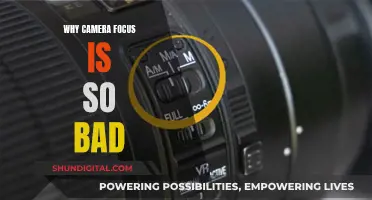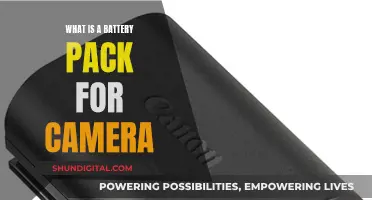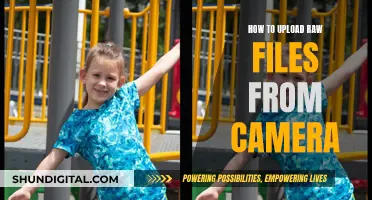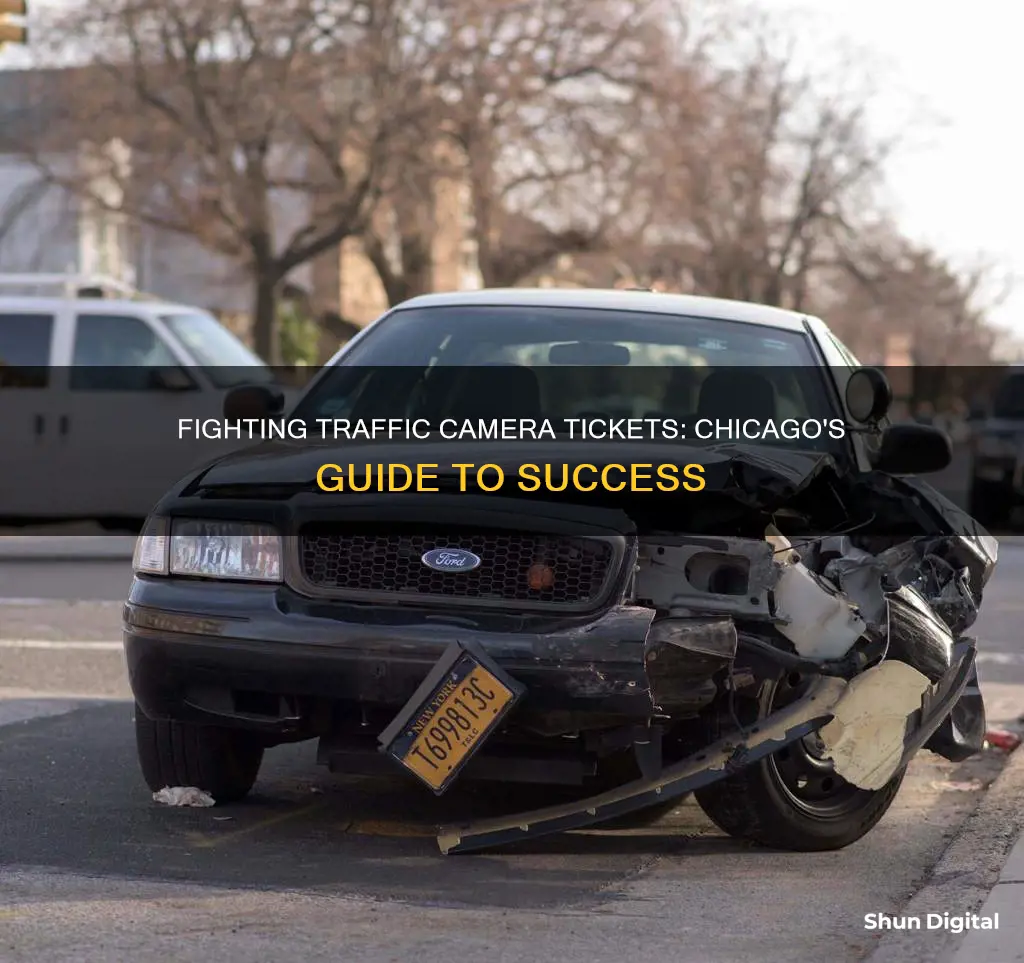
If you've received a traffic camera ticket in Chicago, you might be wondering what to do next. The first thing to know is that you only have a limited amount of time to respond—21 days from the Notice of Violation date. Within this time, you can contest the ticket by mail, online, or by requesting an in-person hearing. This is your opportunity to plead your case and present any evidence you wish to be considered. It's important to act promptly, as failing to pay or contest the ticket on time can result in doubled fines and potential penalties, such as the towing of your vehicle or suspension of your driver's license.
| Characteristics | Values |
|---|---|
| Time to contest | 21 days from the Notice of Violation date |
| Ways to contest | By mail, online, or by requesting an in-person hearing |
| Defenses | Not the owner of the vehicle, vehicle or plates were stolen, facts in the notice are inconsistent, vehicle was an authorized emergency vehicle, etc. |
| Penalty for ignoring | Doubled fines, towing of the vehicle, suspension of the driver's license |
What You'll Learn

Review the evidence and check for inconsistencies
If you've received a traffic camera ticket in Chicago, you can take steps to review the evidence and check for inconsistencies. Here's a detailed guide to help you through the process:
Understanding the Evidence:
- Access the Evidence: When you receive a traffic camera ticket in Chicago, the City of Chicago Department of Finance Citation Administration Division will provide you with access to the evidence they have against you. This typically includes photographs and video footage of the alleged violation.
- Review the Details: Start by carefully examining the photographs and videos provided. Look for any identifying details of the vehicle in question, such as the make, model, and license plate number. Ensure that all the information presented is accurate and pertains to your vehicle.
- Check for Inconsistencies: Pay close attention to any inconsistencies or discrepancies in the evidence. For example, if the make or model of your vehicle is listed incorrectly or described as "OTHR," this can be a part of your defense. Additionally, review the facts alleged in the violation notice to ensure they support a finding that the Chicago Municipal Code was indeed violated.
Taking Action:
- Contest the Ticket: If you find inconsistencies or inaccuracies in the evidence, you have the right to contest the traffic camera ticket. You can do this by requesting an in-person hearing, contesting by mail, or submitting a hearing request through the City's website. Act promptly, as you typically have only 21 days from the Notice of Violation date to contest the ticket.
- Prepare Your Defense: When contesting the ticket, present your findings and argue your case. You can refer to the allowed defenses listed on the City of Chicago's website to build your argument. For example, if the make of your car was listed incorrectly or was not clearly discernible in the evidence, you may have a strong case for disputing the ticket.
- Provide Supporting Evidence: During the hearing, you can present any relevant evidence that supports your case. This may include police reports, registration documents, receipts, pictures, or any other documentation that helps your defense.
Remember, it's crucial to act promptly when dealing with a traffic camera ticket in Chicago. Reviewing the evidence thoroughly and identifying any inconsistencies can significantly strengthen your position when contesting the violation.
Vivint Doorbell Camera: Battery or Wired?
You may want to see also

Check if the make of your vehicle is listed correctly
If you've received a traffic camera ticket in Chicago, you can take steps to review the evidence and possibly contest the ticket. One important aspect to check is whether the make of your vehicle is listed correctly. Here are some detailed instructions on how to verify the accuracy of the vehicle's make and potentially build a case for disputing the ticket:
- Review the Ticket Details: Start by carefully examining the traffic camera ticket you received. Look for any information about the vehicle's make that was captured in the photos or videos associated with the ticket. In Chicago, the registered owner of the vehicle is typically held responsible for these types of violations.
- Analyze the Visual Evidence: Request access to the visual evidence associated with the ticket, which may include still photographs and video footage. You can often view this evidence online or by contacting the relevant city department. Pay close attention to the make of the vehicle in the images and videos.
- Compare with Your Vehicle: Compare the make of the vehicle listed on the ticket and/or shown in the visual evidence with the actual make of your vehicle. Look for any discrepancies or inconsistencies. For example, the ticket or evidence may show the make as "OTHR" or another incorrect designation.
- Document the Discrepancy: If you find that the make of your vehicle is listed incorrectly, document this discrepancy. Take clear notes on how the make differs from the actual make of your car. You can also take screenshots or mark the specific sections of the visual evidence that show the incorrect make.
- Build Your Case: The incorrect listing of the vehicle's make may be a valid reason to contest the ticket. Gather all the evidence you have that supports your claim, including the ticket itself, visual evidence, and any other relevant documentation. You can use this evidence to demonstrate that the make of your vehicle was incorrectly identified, raising doubts about the accuracy of the ticket.
- Prepare Your Defense: Familiarize yourself with the allowed defenses for this type of violation in Chicago. In some cases, an incorrect listing of the vehicle's make may be sufficient grounds for disputing the ticket. However, review the list of accepted defenses provided by the City of Chicago to strengthen your case further.
- Initiate the Dispute Process: You typically have a limited time window to contest a traffic camera ticket in Chicago, often 21 days from the Notice of Violation date. You can choose to dispute the ticket by mail, online, or by requesting an in-person hearing. Clearly present your evidence and arguments during the dispute process, highlighting the incorrect listing of the vehicle's make.
Remember to act promptly as failing to respond to the Notice of Violation within the specified timeframe may result in penalties and a loss of your ability to challenge the ticket. By carefully checking the make of your vehicle listed on the ticket and associated evidence, you can identify potential inaccuracies and improve your chances of successfully disputing a traffic camera ticket in Chicago.
Mercedes In-Car Cameras: Privacy and Safety Concerns
You may want to see also

Identify if there was a reason or excuse for your violation
If you have received a traffic camera ticket in Chicago, you can fight it by identifying if there was a valid reason or excuse for your violation. Here are some steps to help you identify if there was a reason or excuse for your violation:
- Review the evidence promptly: You only have 21 days to contest a traffic camera ticket in Chicago. Log on to the camera's online system and carefully review all the evidence, including photos and videos. Check if the make and model of your vehicle are correctly listed and clearly discernible in the evidence.
- Identify any discrepancies: Look for any inconsistencies or errors in the information provided. For example, if the make of your car is listed incorrectly or if there are discrepancies in the date, time, or location of the violation. These discrepancies may form a valid part of your defense.
- Analyze the photos and videos for violations: Review the images and footage to determine if a violation actually occurred. In the case of red light camera tickets, check if the photos and videos show your vehicle crossing the limit line or entering the intersection after the light turned red. If not, there may be no proof that you violated the law.
- Check for required signage: Some states or cities require signs that inform drivers about the presence of red light cameras. Verify if such signage is required in Chicago and whether it was properly posted at the intersection where the violation occurred. If the required signage was missing or inadequate, this could be a valid defense.
- Determine if there was a valid excuse: Think about the circumstances surrounding the violation. Was there an emergency or a situation that necessitated your actions? For example, were you speeding to get someone to the hospital, or were you taking evasive action to avoid a collision? These types of excuses may be considered valid defenses in some jurisdictions.
- Review allowed defenses: The City of Chicago provides a list of allowed defenses for traffic camera tickets. Carefully review this list to identify if any of the listed defenses apply to your specific situation.
Remember, it is essential to act quickly and gather as much evidence as possible to support your case. You may also want to consult with a legal professional who can guide you through the process and help you identify any applicable reasons or excuses for your violation.
Finding the Chevy Camaro's Battery: Location and Access
You may want to see also

Contest the ticket by mail, online, or request an in-person hearing
If you want to contest a traffic camera ticket in Chicago, you have three options: by mail, online, or by requesting an in-person hearing. The City of Chicago allows 21 days from the Notice of Violation date on the ticket to contest it.
Contesting by Mail
To contest a traffic camera ticket by mail, fill in the "request for in-person hearing" bubble on the ticket envelope. Alternatively, return the envelope provided with the mailed Notice of Violation, along with your written defense.
Contesting Online
You can also contest a traffic camera ticket online. Visit the City's website and click on the link "Submitting a Hearing Request via the City's Website." Follow the instructions to request an in-person hearing.
Requesting an In-Person Hearing
To request an in-person hearing, call the City of Chicago's Ticket Helpline at 312-744-7275 or 312-744-7277 (TTY – Hearing Impaired). You can also request an in-person hearing by mail. Fill in the "request for in-person hearing" bubble on the ticket envelope or return the envelope provided with the mailed Notice of Violation.
Regardless of the method chosen, it is important to act promptly, as failing to respond to the Notice of Violation within 21 days will result in a Notice of Determination, indicating that you have been found liable by default. After 25 days, a Notice of Final Determination will be sent, informing you that your options to challenge the ticket have been forfeited, and the penalty amount will double.
Camera Raw Modifications: Non-Destructive and Creative Freedom
You may want to see also

Know the allowed defences for your type of violation
The City of Chicago has a list of allowed defences that you should review as you plan your defence. Here are some common defences that are recognised by law:
- The vehicle owner wasn't driving the vehicle: In most states, it's the driver—not the vehicle owner—who's liable for the violation. Many states allow owners who receive tickets to submit an affidavit swearing that they weren't driving when the violation occurred, which will generally result in the dismissal of the ticket.
- The photos and videos don't show a violation: The photos and videos must show the vehicle crossed the limit line or entered the intersection after the light turned red. Otherwise, there's no proof that the driver actually violated the law.
- Inadequate signage for red-light cameras: Most states that allow red-light cameras have specific rules requiring signs to be posted at any signal using cameras. A driver might have a defence if signs weren't posted at the intersection or the signs that were posted didn't meet the legal requirements.
- Red-light camera malfunctions: Red-light camera systems are fairly accurate, but they're not perfect. These automated systems occasionally get triggered even though the driver didn't actually run the light. It's important to review the photos and videos to verify that they depict a true violation.
- Standard red-light ticket defences: Some defences that would normally apply to a red-light ticket also work for red-light camera tickets. For example, showing that you went through the light because you were directed to do so by a law enforcement officer, it was necessary to yield to an emergency vehicle, or you were driving an emergency vehicle during an actual emergency.
- Blurry photos: If the license plate isn't clearly visible, it may be difficult to confirm that the car is yours.
- No clearly identifiable photo of the driver: If there's no clearly identifiable photo of you in the driver's seat, you can argue that the prosecution can't prove you were driving, or has no evidence that you were driving.
- Necessity defence for speeding: Some states recognise a necessity defence for speeding. Since a camera cannot tell why you were speeding, you may be able to get out of the ticket this way.
Ai Weiwei's Surveillance Camera Sculpture: Global Locations, One Message
You may want to see also
Frequently asked questions
You can contest a traffic camera ticket in Chicago by requesting an in-person hearing. You have 21 days from the Notice of Violation date to contest the ticket.
The allowed defenses for a traffic camera ticket in Chicago include:
- The respondent was not the owner or lessee of the cited vehicle at the time of the violation.
- The cited vehicle or its state registration plates (license plates) were stolen at the time of the violation.
- The facts alleged in the violation notice are inconsistent or do not support a finding that the Chicago Municipal code was violated.
- The vehicle was an authorized emergency vehicle.
Ignoring a traffic camera ticket in Chicago can result in doubled fines and potential penalties, including the towing of your vehicle and suspension of your driver's license.
You can view the footage of a traffic camera ticket in Chicago by visiting the city's website or by requesting access to the video recording and still photographs from the registered vehicle owner.


